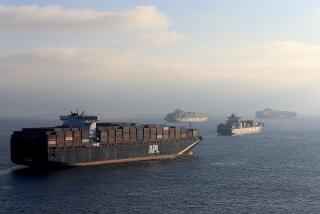Ozone treaty, world wars slowed global warming, study says

Society has slowed down global warming several times over the last century without even trying, new research says.
A study found that the rate of global warming has ratcheted down in response to major world events, including the two world wars, the Great Depression and, most recently, a global ban on ozone-depleting substances.
Researchers attribute the most recent slowdown, since the late 1990s, at least in part to the decline in emissions of chlorofluorocarbons, greenhouse gases that were phased out under the 1989 Montreal Protocol. The international treaty was not intended to fight climate change, but to protect the atmosphere’s ozone layer.
“As a byproduct we got these reductions in warming,” said Francisco Estrada, an economist at the Center for Atmospheric Sciences at the National Autonomous University of Mexico, who conducted the statistical analysis with colleagues in the United States and the Netherlands.
The cooling effect was small but noticeable. Without the ozone treaty, the study found, temperatures could have been 0.18 degrees warmer than they are today.
The study is one of the latest trying to explain the so-called global warming hiatus, a slowdown in the rise of surface temperatures over the last 15 years.
“Paradoxically, the recent decrease in warming, presented by global warming sceptics as proof that humankind cannot affect the climate system, is shown to have a direct human origin,” says the study, published in the journal Nature Geoscience.
Yet the decline in ozone-depleting substances is probably just one of several factors behind the hiatus. Scientists have probed other possibilities, including naturally occurring cycles such as El Niño and La Niña, aerosols in the atmosphere and record heat uptake by the world’s oceans.
The study tied some of the recent slowdown to changing farming practices in Asia. The introduction of chemical fertilizers and more efficient water use in rice cultivation has had a cooling effect since the mid-1990s by cutting emissions of methane, a potent greenhouse gas that is much more effective at trapping heat than carbon dioxide.
Looking back on history, the analysis linked a previous slowdown in global warming between the 1930s and the 1950s to an unparalleled drop in carbon dioxide emissions as economic growth faltered during World War I, the Great Depression and World War II.
The rate of warming started to climb again starting around 1960, a reflection of the sharp rise in carbon emissions from industrial activity in the booming post-war economy, according to the study.
In a way the findings are encouraging, Estrada said, showing that human intervention can ease climate change, even inadvertently. But they should not be a reason for complacency when it comes to getting greenhouse gas levels under control, he added.
“If things keep going the way they are, carbon dioxide emissions will completely erase this slowdown in warming,” Estrada said. “This might be only a temporary relief.”
Twitter: @tonybarboza







